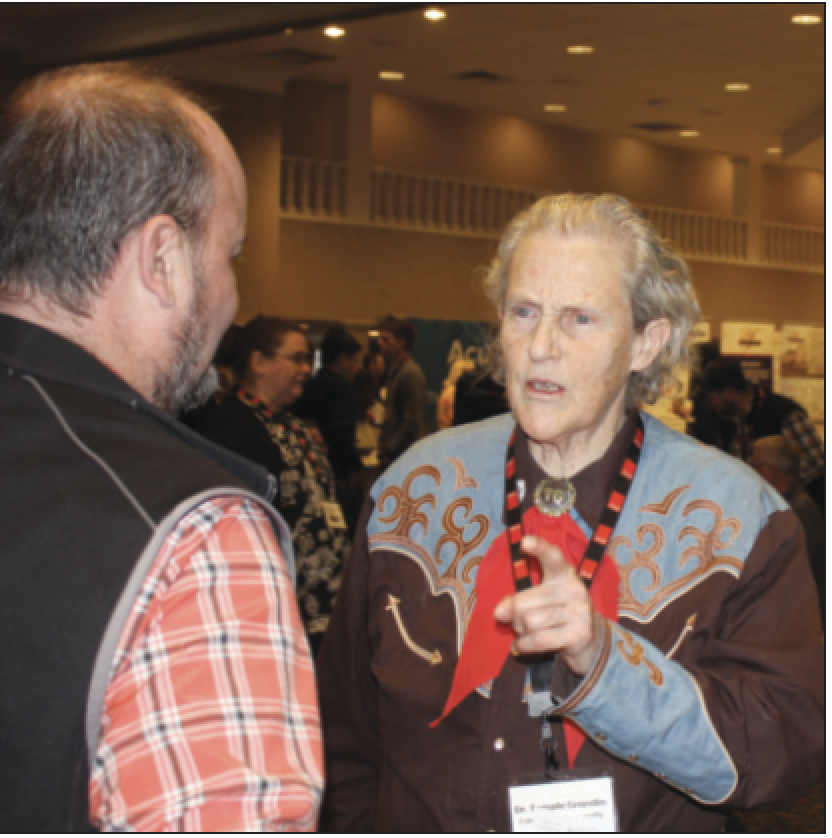
The world’s rock star of animal handling and welfare was greeted with thunderous applause by the 325 attendees when she was introduced at the Saskatchewan Pork Industry Symposium on Nov. 5 in Saskatoon.
Temple Grandin is a best-selling author, an innovator, a professor and an advocate for animals. In 2010, HBO made a movie about her life. Accomplished actor Clair Danes played the role of Grandin.
In 2010, Time Magazine named her one of top 100 most influential people. In 2020, she was named one of the top 10 Best College Professors by CEO Magazine.
Facilities she designed are in use the United States, Canada, Europe, Mexico, Australia, and New Zealand.
Her life’s work can perhaps be summed up in this quote.
“Nature is cruel but we don’t have to be; we owe them some respect. I touched the first cow that was being stunned. In a few seconds, it was going to be just another piece of beef, but in that moment it was still an individual.”
“It was calm … and then it was gone. I became aware of how precious life was. I thought about death and I felt close to God. I don’t want my thoughts to die with me. I want to have done something.”
She said her greatest accomplishment — the one she is the proudest of — was an audit she did in 1999 on the suppliers of major burger chains.
She devised a system that measured the treatment of animals. Plant managers lost their jobs when they didn’t comply. The system worked.
“When I saw McDonald’s, Burger King and Wendy’s all enforcing that, I saw more improvement than I had seen in my 20-year career prior to that. We forced them to enforce it and manage it.”
Grandin, a professor at Colorado State University, directed much of her presentation at the Sask. symposium to students in the conference room. She said one of the first things she learned was the importance of having your work published.
“I’ll tell you where I made a mistake. I never got my PhD research thesis published. My professor was obsessed with correctly grammar and I couldn’t deal with that.
“Another thing that one of my lab colleagues did that didn’t get published was research on feeder design. We are still using the same bad feeders that waste feed. In some feeders, 10 to 20 per cent of the feed goes down the floor. That is another big waste.
“A great big bowl feeder where they can eat like a pig and not throw it on the floor. The design of facilities is not going to fix everything,” she added. “I cannot emphasize that enough . . . right now we are going into the age of AI. We still need the stockmanship on the basics.”
She is a proponent of loading pigs in small numbers. She said she can load 20, five at a time, faster – 20 minutes faster — than someone can load all 20 at once.
“The small group thing is really really important but that handling is going to take more walking and you constantly have to stay on top of it.”
Grandin, who has been in the industry for over 50 years, has seen how attitudes toward animals has changed.
“We weren’t even allowed to use the word ‘welfare’ in the ’70s.”
In the ’90s, she had a tussle with some members of a cattle committee she chaired.
“They didn’t think animals had emotions and didn’t think they had feelings and didn’t think they felt pain. Well, I thought that was totally ridiculous . . . All animals have fear.”
Grandin said those handling animals have to have good stunning practises, so the animal feels no pain and becomes instantly unconscious.
Grandin emphasized that she is a visual thinker.
“So, when I started out, I got down in the chute to see what pigs and cattle were seeing. People thought that was crazy. I didn’t know at the time that other people are verbal thinkers. But a visual thinker has a different approach to problem solving than a mathematical thinker.
“I am concerned that a lot of genetic research is going all mathematics. We still have to look at these animals. I am concerned that my kind of thinker is going to get screened out. They need us. We have a lot of big problems to solve in the future.”
She said she has seen a lot of improvement in the handling of hogs and cattle.
“Industries have been having all kinds of workshops. We have beef quality assurance; we have pork quality assurance; we have trucker quality assurance.
“These are all very good things.” •
— By Cam Hutchinson





